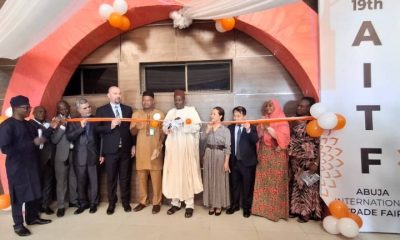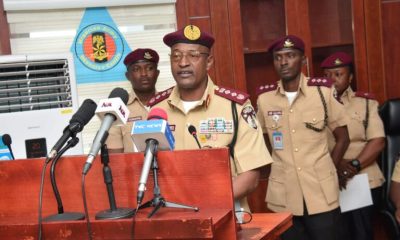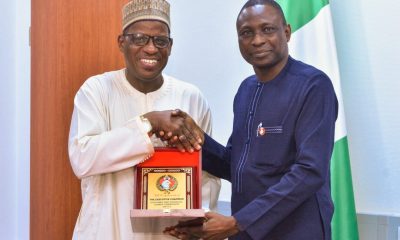Environment
US to Partner Nigeria to Stop Gas Flaring by Conversion to Ammonia

By Joseph Amah, Abuja
Nigeria’s energy transition agenda, in line with global direction received a boost on Thursday at the CERAWeek energy conference in Houston, Texas, as the United States’ Government indicated interest in a bi-lateral partnership that would see the conversion of the enormous gas resources currently being flared to ammonia.
Ammonia has the potential of being a huge revenue earner for the country especially as the European Union, in pursuit of the net zero-emission programme, has unveiled its long-anticipated plans to make importers and non-EU manufacturers pay for the carbon emissions associated with the goods and materials they sell in the EU, thus impacting on vessels powered by fossils fuels entering EU territory.
Since running such vessels during that tax regime will not be economically viable, there is the need to redesign engines of such vessels; and attention is already being focused on ammonia as an alternative fuel source, to replace heating oil and other fossil fuels. The resort to ammonia is because it is not just cleaner, but a cheaper source of energy.
Invariably, it means there would no longer be an easy and attractive market for heating oil, one of the most highly sought-after products in the configuration of Nigeria’s refineries. The adoption of the Carbon Border Tax by the EU has the potential of hurting the Nigerian economy which is largely serviced with proceeds from its hydrocarbon potentials. This would compound the challenge already posed by the vigorous pursuit of the zero-emission plan by the developed countries, due to the reduced earnings from Nigeria’s refinery configured products such as heating oil (i.e. LPFO, HPFO).
The Paris Agreement and the United Nation’s Framework Convention on Climate Change seeks to limit the development of oil and gas projects in the pursuit of more environment friendly energy options – from fossil fuels to green and renewable energy – in the next two decades. This poses enough threat to the country’s major revenue stream, which is why sustaining current revenue drivers and considering other viable options became the major thrust of discussions by Nigeria at the conference.
The energy transition agenda therefore became the centre of focus for the Nigerian delegation, led by the Minister of State for Petroleum Resources, Chief Timipre Silva and which included the Chief Executive of the Nigerian Upstream Petroleum Regulatory Commission, Engr. Gbenga Komolafe and the Board Secretary and Legal Adviser to the NUPRC, Barrister Olayemi Anyanechi. The team continued to drive conversations around energy transition in a multi-track approach at the various meetings held with top officials of the global energy circuit. It argued that instead of a complete abandonment of further development of hydro-carbon infrastructure and phasing out fossil fuel use within the stipulated period, a multi-track approach where gas would be adopted as transition energy source would be fair and just to be pursued, as that was more practicable and sustainable, particularly in respect of developing countries.
Silva explained that Nigeria already has a transition plan which is predicated on a multi-track approach to developing energy resources. One of those is a focused development of the country’s gas resources during which period a diversified economy would be built around technology and other energy sources. That, he stressed, would help a great deal in boosting the country’s revenue levels and sustaining its economy.
Discussions on the subject were taken from different perspectives, including zeroing-in on gas potentials and the implication of continued gas flaring and reinjection. The effect of flaring on the environment and health of the people of oil-bearing communities was specifically highlighted as the team explored concrete ways of ending the menace. The point of convergence is the responsible monetization of Nigerian’s gas resources which the American counterparts were in agreement. The US team appreciated the multifaceted approach to curtail emissions proposed by the Nigerian government and made suggestions on innovative ways to develop stranded gas resources in a more responsible manner, some of which include the use of Blue Hydrogen which is obtained when natural gas is split into hydrogen and CO2 either by Steam Methane Reforming (SMR) or Auto Thermal Reforming (ATR). However, the CO2 is captured and stored, which in return mitigates the harsh impact on the environment.
This the US team suggested would be a good way for Nigeria to utilize its abundant Natural gas resources of over 200 trillion cubic feet (TCF). During one of the several meetings which involved the US Secretary of State for Energy, Jennifer M. Granholm, and a second which involved Honourable Harry Kamian, Assistant Secretary of State for the U.S. Department of State Bureau of Energy Resources, the United States Government showed interest in collaborating with the Nigerian government to develop the country’s gas resources, recognising that Africa may indeed need to be given separate recognition, as long as development of natural gas hastens the net-zero emissions target of the Federal Government of Nigeria and the world at large.
Furthermore, the U.S. DOE promised to support Nigeria with development partners to put through the framework for the development of its gas resources. Riding on the optimism of the meeting with the U.S. Secretary of State for Energy, the the Nigerian Upstream Petroleum Regulatory Commission (NUPRC) team met with Brendan Kelly of the U.S. Department of Commerce and Puneet Sharma of CyanNH3 to discuss extensive methane abatement opportunities in Nigeria, in partnership with the United States government, especially in the area of conversion of gas to ammonia, for use either as fertiliser or for export.
The team highlighted the fact that the proposed EU Carbon Border Tax would put severe financial pressure on the use of LPFO and HPFO by vessels and provide a renewed impetus for producers around the world to accelerate efforts to slash their carbon footprints, thus creating a massive opportunity for the use of ammonia as the fuel of choice. In response, the US team promised to collaborate with the Nigerian government by funding a study to evaluate the viability of making Nigeria an Ammonia net export nation from the 218 flare sites which flare an average of 0.7 Billion cubic feet (BCF) of gas daily, with skid mounted innovative ammonia production equipment’s and other virtual pipeline development devices.
Moreover, the US Department of State and Department of Trade agreed to collaborate with Nigeria by working together with development partners to fund a study to mature these initiatives into full gas commercialization and convert the waste into a source of federation revenue generation, while eliminating the environmental degradation.
Finally, the successful take off of the project will not only open another massive revenue stream for the country but would tackle the challenges of environmental pollution and the resultant health challenges visited on the people of oil producing communities, as a result of gas flaring. In essence, the success of ongoing discussions with the U.S. government and proposed development partners will not only arrest environmental degradation and guarantee the health of the people, it also has the potential to generate much needed foreign exchange for the country.
Environment
Prolonged Public Holidays Come with Negative Economic Effects on Citizens – Anambra Residents

Anambra residents have slammed the additional day approved by the Federal Government for the Muslim faithful to celebrate the 2024 Eid-Ei-Fitr, saying this will have negative effects on the economy.
The Federal government had early declared April 9 and 10 as Muslim-Ummah for the successful completion of a month’s spiritual rejuvenation.
Reports says that residents of Anambra capital city believe that the additional day which they did not plan for will result in economic hardship to the citizenry.
Most respondents believe that people had planned to resume their economic activities instead of wasting their time staying at home doing nothing..
Former Chairman, Awka Chamber of Commerce, Chief Felly Akosa, described the additional day to the two days approved earlier as “unfair to the economy of the country as people were unprepared for the additional day.
Akosa said that although it is right for the Muslim faithful to celebrate their holiday after a month-long fasting, the process needs to be carefully planned for in place of the additional rest day which could inhibit business activities.
Chief Damian Okeke-Ogene, National Vice President of Igbo Apex Social Cultural body, Ohanaeze Ndigbo, said the policy would cause huge economic waste as businesses are put on hold,
He advised that, in future, a proper and well planned programme needs to be in place before declaring a public holiday for any celebration that will be national.
“Our economy and other sectors are not very healthy,” and it would, therefore be appropriate to plan well to avoid declarations that will hamper the citizens’ welfare.
Mazi Christian Beluchukwu, a business man in Awka, described the extension of the Eid-El-Fitr public holiday to Thursday, April 11, as an added hardship for the citizenry.
Beluchukwu said that any public holiday for three days, April 9 to 11, to celebrate any feast in the country is an economic loss to the nation.
He said that it was best to stick to the two-day national public holidays as this gives room for the people to plan their activities very well.
He stated that his wife went to a public hospital on Tuesday and was unattended to because there was no doctor on seat to provide medical attention.
“She resorted to visiting a private hospital which cost extra money which the public hospital is expected to handle at a reasonable cost. (NAN)
Environment
World Bank Fund: Corporation Rehabilitates Treatment Plant, Reticulation in Jos South

The Jos Water Services Corporation (JWSC) has said that the World Bank fund received would be used to boost water supply to Bukuru and environs in Jos South Local Government Area.
Mr Apollos Samchi, the Managing Director of the corporation, said that N1.7 billion would be expended on the rehabilitation of water treatment plant, over head steel tank and laying of pipes to homes of consumers.
Samchi, who disclosed this on Friday in Jos, during a two-day capacity building workshop, said that the projects were expected to be completed in four months.
Reports says that the workshop organised for contractors has at its theme: “Implementation of Environmental and Social Management Plans for Projects in Jos South.
The MD said that the projects would ensure steady provision of potable water to residents in Gyel and Kurgiya in Jos South Local Government Area.
He said the treatment plant when rehabilitated would pump out 5,000 cubic litres of water daily.
The MD further stated that the reticulation exercise would cover residents who weren’t initially connected to public water supply in the area.
Samchi said that the essence of the workshop was to ensure that the contractors were trained to develop adequate measures and controls to minimise and mitigate potential environmental and social risks that could adversely affect the project implementation.
He called on all the contractors handling the projects to ensure that they adhered to the environmental and safety standards and deliver within the specified timeframe.
In his remarks, Mr Jonathan Malann, the Plateau Project Coordinator, Sustainable Urban, Rural Water Supply, Sanitation and Hygiene programme (SURWASH), also advised contractors to adhere to the environmental and safety standards as provided by the World Bank.
The Federal Government had received $700m financing from the World Bank to ensure that all its people have access to sustainable and safely managed WASH services.
The seven participating states are Plateau, Delta, Ekiti, Gombe, Imo, Katsina, and Kaduna.(NAN)
Environment
Erosion Control Project: Gombe SEC Approves N389m Compensation for Residents

The Gombe State Executive Council (SEC) has approved payment of N389 million as compensation for residents that would be affected by the gully erosion control project at Federal College of Education (FCE) Technical and its surrounding communities.
The Commissioner for Finance, Gombe State, Malam Mohammed Magaji, stated this at the end of the SEC meeting on Friday in Gombe.
Magaji said the payment, which would commence immediately, would be for individuals and organisations along the gully erosion site.
He said almost 1000 persons were expected to benefit from the gesture.
According to him, the compensation is part of the requirements of the World Bank, which specifies that such payments be made to property owners.
Magaji said the payment would also be made to ensure seamless resettlement of affected persons.
“The beneficiaries are in hundreds, almost a 1,000 people; there is compensation for houses, and also for business premises.
“There is also stipends for the elderly living around that area so that they are able to have good livelihood,” he said.
The commissioner for Education, Hajiya Aishatu Maigari, also said the SEC approved upgrade of the five mega senior secondary schools in the state to sustain improvement in the education sector.
Maigari said the upgrade would be carried out based on the needs of each of the schools.
She stated that infrastructure in some of the schools were already being upgraded to global standards.
“We have seen construction of toilets, installation of solar-powered light, construction of roads, school clinics, boreholes and many more,” she said.
The News Agency of Nigeria (NAN) reports that the state government had on Nov. 23 signed a N12 billion contract with Triacta Nigeria Ltd. for a 21-kilometre gully erosion control work in six communities within Gombe metropolis.
The project is under ACRESAL project, a World Bank-assisted project to address the challenges of land degradation and climate change in northern Nigeria. (NAN)


















